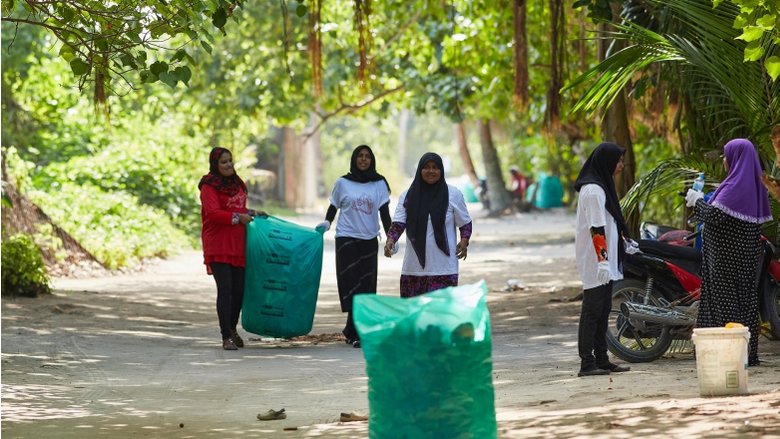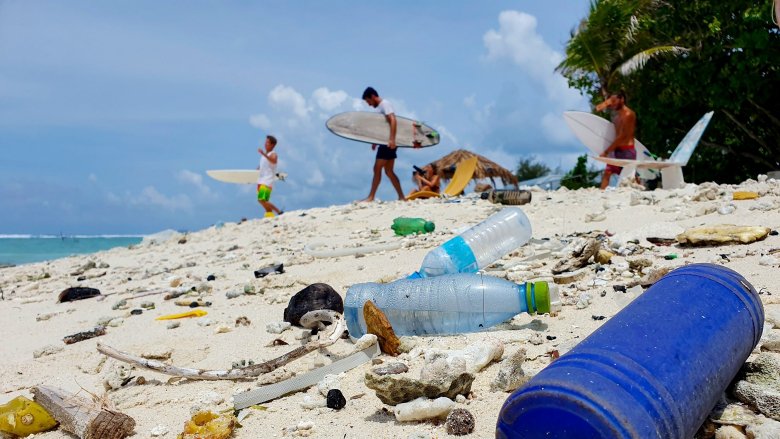Fighting and Befriending Waste: How It¡¯s Done
Develop waste management facilities: Several development partners, including the World Bank, have been supporting investments in the Maldives to develop inhabited island waste and resource management centers and regional waste processing facilities such as the Vandhoo Regional Facility in the north, to manage its waste in a more efficient and environmentally friendly manner. The government has pivoted recently to introduce more decentralized atoll-level waste management strategies that will help strengthen coordination and efficiencies at the local levels and increase local processing of waste to reduce reliance on central facilities, thereby also saving transportation costs.
Strengthen national policy: Starting June 1, 2022, the government . This policy has been informed by a series of World Bank-funded pilot initiatives conducted in conjunction with local NGOs to increase awareness of marine litter and incentivize citizens to use alternatives to single-use plastics.
Citizens are overall optimistic about this policy. Noted Maldivian environmental activist Shaahina Ali says, ¡°For me, this first step of phasing out plastics from the Maldives, although a very small one, is a very bold and positive one.¡± Ali works for , also a World Bank partner that has helped organized numerous beach cleanups and awareness-raising events with school children and adults. Ali exclaims with characteristic passion, ¡°I go there to clean up with hope¡hope that my grandchildren will see whales in the ocean in their lifetime as I did growing up.¡±
Source segregation of waste: While investing in waste management facilities and banning single-use plastics are important, the segregation of waste at source¡ªnow required by law¡ªis this archipelago¡¯s highest priority waste management solution. If there is any silver-bullet approach to focus on, this is the one. Segregation and pre-processing of individual waste streams at source help reduce the amount of residual trash that requires transportation at high cost. It also increases the materials that can be recycled and re-used.
World Bank PROBLUE-funded pilot initiatives led by the ), Parley for the Oceans, and another local NGO, Zero Waste Maldives, promoted household kitchen gardening and composting training across all atolls to stimulate source separation of waste. The workshops were community based and have inspired passion and a sense of unity from participants:
¡°Let¡¯s show public spaces as pleasant places for visitors.¡±
¡°No one else is going to come to clean our island. It is up to us to keep it clean.¡±
Developing new business models: The NGOs are also actively promoting the re-use and recycling of waste, creating building blocks for behavior change and business models for the community. MACCS brought local women together to make reusable bags from used garments, and subsequently incentivize local businesses to replace plastic bags with cloth ones and reward customers who use them repeatedly. Also, since women play a significant role in the waste management hierarchy in the Maldives¡ª³Ù³ó±ðy oversee household shopping and waste disposal¡ªengaging, informing, and empowering women on waste management can bring solutions and major shift in attitudes on the islands.
¡°The good news is that the potential to use waste for more productive purposes is largely untapped, so there is tremendous room for improvement, forward thinking, and innovation in the waste to wealth management approach in the Maldives,¡± explains Karin Shepardson, World Bank Task Team Leader for MCEP.
Forge public-private partnerships: For a nation known for its ¡°one island, one resort¡± concept, public-private partnerships with resorts located within the same atoll and sharing the same protected waters, is key to the success of sustainable waste management. The Maldives has experienced resounding success with the initiative launched by the Maldivian resort, Soneva Fushi, in partnership with a group of 11 neighboring Islands to pledge to end the open burning of island waste and shift towards eco-friendly waste management. In December 2021 alone, of the more than 4,700 compressed packages of waste from these islands weighing 63,000 kilograms, an impressive 87 percent was ¡°treatable waste¡± that could either be handled on the island itself by composting organic waste or transported elsewhere for recycling.


